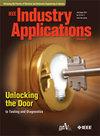$H_{\infty}$ Robust Second-Order Generalized Integrator Phase-Locked Loop for Grid Synchronization of Single-Phase Inverters
IF 4.5
2区 工程技术
Q2 ENGINEERING, ELECTRICAL & ELECTRONIC
引用次数: 0
Abstract
This article proposes a new design framework based on$H_{\infty}$ 用于单相逆变器电网同步的鲁棒二阶广义积分器锁相环
本文提出了一种基于$H_{\infty}$控制理论合成锁相环环滤波器(LF)的设计框架。以频率固定型和频率自适应型二阶广义积分器(SOGI)锁相环为例,考虑SOGI模块对锁相环动力学特性的影响,从锁相环的压控振荡器角度阐述了控制问题。通过将权重函数指定为$H_{\infty}$控制问题中锁相环稳定时间的函数,得到最优LFs以实现锁相环跟踪性能的鲁棒性。此外,采用Hankel奇异值近似,在不损失性能的情况下,减少了LF的实现和计算成本。性能方面,通过实验研究,与现有对偶相比,所提出的SOGI锁相环提供了对单相电压频率和相角的可靠估计。最后,与传统的基于比例积分控制的锁相环相比,采用所提出的锁相环进行单相逆变器的电网同步,可以减少功率振荡。
本文章由计算机程序翻译,如有差异,请以英文原文为准。
求助全文
约1分钟内获得全文
求助全文
来源期刊

IEEE Transactions on Industry Applications
工程技术-工程:电子与电气
CiteScore
9.90
自引率
9.10%
发文量
747
审稿时长
3.3 months
期刊介绍:
The scope of the IEEE Transactions on Industry Applications includes all scope items of the IEEE Industry Applications Society, that is, the advancement of the theory and practice of electrical and electronic engineering in the development, design, manufacture, and application of electrical systems, apparatus, devices, and controls to the processes and equipment of industry and commerce; the promotion of safe, reliable, and economic installations; industry leadership in energy conservation and environmental, health, and safety issues; the creation of voluntary engineering standards and recommended practices; and the professional development of its membership.
 求助内容:
求助内容: 应助结果提醒方式:
应助结果提醒方式:


